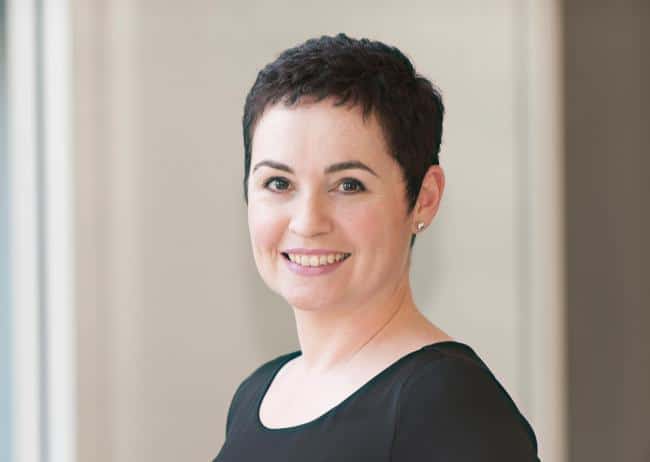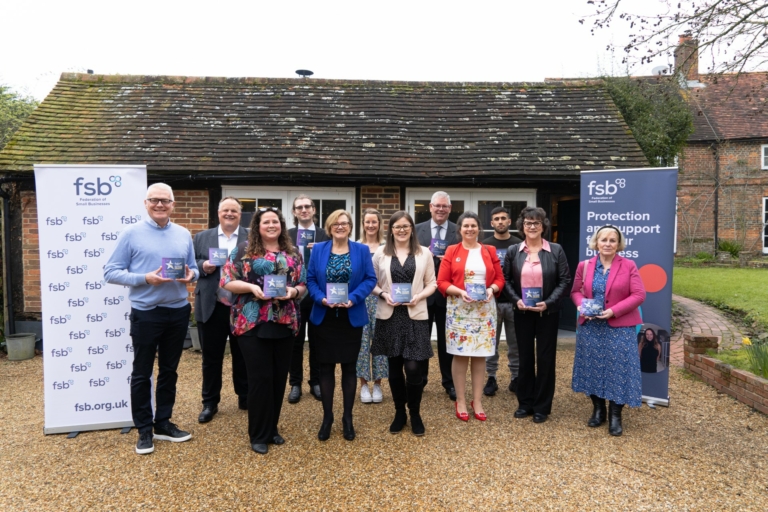Ex-Standard Life CEO Julie Scott on lessons learned from managing through a crisis

The Business Magazine is always keen to showcase new thinking when it comes to tackling real world problems and that is why we have joined up with Label Ventures who last year published a collection of features on strategy, design and innovation under the FLIP banner.
Over the coming weeks and months we will publish a selection of entries from the FLIP book to share some of the innovative ideas contained within.
We would very much like to create a FLIP book full of creative thinking from the South East so if you think differently when it comes to the challenges of work or life and want to share your views then please do get in touch with me Stephen Emerson, head of content for The Business Magazine.
Julie Scott has held senior positions at Standard Life Aberdeen, RBS and Royal London and in this article talks about the people management she has learned throughout here career.
For 19 years, from the ages of four to 23, Julie Scott trained in ballet.
Every week, often several times a week, sacrificing the normal carefree teenage social life she watched her friends enjoying – a sacrifice matched by her family, who would forgo holidays so Julie could rehearse, her older brother taking responsibility for endless drop-offs and pick-ups (at great expense to his love life, he grumbled).
Scott performed at a high level at prestigious venues in Glasgow including the Theatre Royal and the King’s Theatre. Even once injuries took their toll – “I have two dodgy ankles and a dodgy knee and a dodgy hip,” Scott sighs, “ballet ruins your body” – she didn’t give up on her passion and trained to teach ballet instead of continuing performing.
Around the same time, Scott began pouring similar energy into a parallel interest in economics and the financial services industry. Straight out of university she entered Endsleigh Insurance’s graduate training scheme, before being hired by Standard Life then later spending a decade at RBS Group. She has worked on both sides of the Atlantic and furthered her training through programmes at prestigious institutions such as Harvard, INSEAD and Wharton.
Along the way, Scott has had roles in practically everything, from sales to operations and even HR, eventually returning to Standard Life and rising to CEO at their financial planning business 1825. “There’s not really a role in financial services which, if someone said to me, ‘we need you to do that,’ I would have an ‘oh my god’ reaction to,” Scott smiles. We speak as she’s getting ready to take up another top level leadership position, as a Chief Customer Officer at Royal London.
"And quite often, it’s surviving. It’s really clear what the objective is, there is no debate about it. The other big thing for me is that politics, or shenanigans and bad behaviour, goes out the door because there’s no time for it, because everybody’s focused on the mission. I think when you’re in a crisis, you’re really decisive; all the nonsense gets cut out of the way."
A word that comes up a lot during a long and compelling conversation about leadership and managing change in trying circumstances: resilience. “I think leaders have to be unbelievably resilient,” Scott asserts. “You have got to have real dogged determination, and not lose sight of whatever the focus is.”

Just as a series of injuries prevented Scott’s star from rising any further in the ballet world, so too could a succession of cataclysmic crises in banking have curtailed her ascendant career in financial services.
Scott was at Standard Life in the early 2000s when they ran into trouble after massively over-indexing in equities; when the financial crash struck in 2008, she was at RBS Group, unsure whether each day might be the grand old institution’s last.
Scott helped hold the line again in 2012 when RBS’s computer systems spectacularly failed, sending shockwaves around the world once more. Time and again storms have struck the financial services industry throughout Scott’s now 25 year career. She has weathered them all.
As most of us will have no doubt discovered over the last many months, throughout the global pandemic and all of the seismic change it has wrought upon our lives and upon the world, a crisis can teach us a lot of very valuable lessons.
Not least about the importance and very nature of resilience. “I think what happens in a moment of crisis is two or three things,” says Scott. “One: the mission becomes really clear.
And quite often, it’s surviving. It’s really clear what the objective is, there is no debate about it. The other big thing for me is that politics, or shenanigans and bad behaviour, goes out the door because there’s no time for it, because everybody’s focused on the mission. I think when you’re in a crisis, you’re really decisive; all the nonsense gets cut out of the way.”
A crucial observation Scott has made in times of crisis is how adaptable people can suddenly become – in ways which they had never previously thought possible. “When we were all kind of getting the sense that the country was maybe going to go into lockdown,” says Scott, “and we were going to have to work from home, a lot of things that people said could never happen, and fought and resisted, happened” – she clicks her fingers – “like that.
“One thing was: ‘oh, our clients will never deal with us unless we meet them in person, over a cup of tea.’ Well, it turns out our clients were really comfortable, really quickly, to move to things like Zoom or conference calls. It was the same in the banking crisis – a lot of things inside the organisations that people said could never happen suddenly had to happen.”

Vital to managing change in trying circumstances is the power of consensus. “You have to show people why you’re doing it, how you’re going to go about doing it, why this is going to be better,” Scott explains. “Why it’s going to improve things, why it’s going to help customers, why it’s going to ultimately help the bottom line.
“I think people fear things if they don't understand them,” she adds. “I think your job is to not just say ‘look, here’s a great idea, let's crack on’, it’s to say ‘look, I've got some thoughts,’ and you try and take people along with you, paint the picture. People talk about human beings hating change, but human beings are incredibly adaptable if we understand where we’re going, why, and how to get there.”
While Scott has no desire to ever weather another major crisis – she’s been through more than enough of them by now, thank you very much – she admits that there’s a part of her that wishes the level of performance it brings out in people would remain and that organisations would continue to operate at crisis level even as danger subsides. “The behaviours in a crisis are often really, really good,” she reasons. “And I think that’s when you’re at your most, you’re all slightly more creative, because you don’t need to spend forever influencing and cajoling and humouring. Because, frankly, I think that’s all a waste of time.”
Focus on the customer
Even as Scott has ascended to leadership positions of greater and greater responsibility, further and further from the day-to-day operations of banking, she has made it her mission to never lose sight of one key thing: a focus at all times on the customer. “I remember working with Steven Hester, who was brought in to take over from Fred Goodwin at RBS Group at the height of the banking crisis,” Scott reflects. “He was such a humble guy, super bright, super intelligent. He said to me: ‘Julie, we all work to serve the customer, and it doesn’t matter whether you’re me, the Group Chief Executive, or whether you’re a teller in one of our branches; every single person serves the customer.’
“I talk about my ‘decompression chamber. You go into situations that can be challenging, they can be crisis situations – you work in the banking crisis, you’re on the verge of not knowing whether the doors will be open in the morning or whether the doors will be padlocked. Because that is how close RBS Group was to collapse; it’s all well documented. As a leader, you’re responsible for tens of thousands of people, their livelihood, their families, and you’re responsible for millions of customers. That’s a huge responsibility."
“I completely agree with that,” she says, “I really think that’s the right belief to have, and it really comes from people at the top. It’s so easy to get focused on, you know, a project or a campaign or a quarterly set of results and lose sight of the fact that, at the end of the day, it comes back to supply and demand. You need to be making something that somebody wants to buy.”
While conflict is not something that Scott relishes in her work, having a “difficult conversation,” as she puts it, is something that she never shies away from whenever it’s necessary. “I think avoiding conflict or avoiding a difficult discussion – it doesn’t advance the agenda,” she says. “It doesn’t make things better; it doesn’t evolve things. I think it comes back to that resilience. You’ve got to be able to put your position over, but it doesn’t mean that you’ll always win. You need to be not afraid to fail. You might not win every point – and actually everything isn’t a point or a debate, either. It’s about trying to advance the agenda.”
Scott’s rationale is simple: if you’re not prepared to put a different position over, the risk is that you won’t grow and deliver better things in an ever-changing landscape. “Your customers will leave because there’s constantly new things coming onto the market,” she says, “there’s new players coming into the market, there’s new technology, there’s different routes to finding new customers, or different ways to retain customers.”
Another important point Scott makes about conflict resolution is that it needs to be a two-way street, no matter how high up you may be in an organisation – as one particular example from her time at RBS attests. “I think, if you work with a team of people, and they never disagree with you, that’s a major problem,” she says. “I remember when I was leaving RBS Group, Ross McEwan – who was going to be the new chief exec at the time – he said to me: ‘what’s the one piece of advice that you would give me?’ And I said to him: ‘when was the last time anybody in your team disagreed with you to your face?’ He said, ‘hmm, that’s a good point.’
“If you have to think, then that’s a problem,” Scott continues. “Because, guess what: they’re not agreeing with you 100% of the time when they come out of the room. That debate has to happen in the room, because otherwise it’s utterly confusing for colleagues. If it’s not happening, then I think you could end up with a real passive aggressive culture.”
Resilient as any leader may be, the stresses and strains have to take their toll over time. How has this former dancer learned to maintain her balance and poise? “I talk about my ‘decompression chamber,’” she replies. “You go into situations that can be challenging, they can be crisis situations – you work in the banking crisis, you’re on the verge of not knowing whether the doors will be open in the morning or whether the doors will be padlocked. Because that is how close RBS Group was to collapse; it’s all well documented. As a leader, you’re responsible for tens of thousands of people, their livelihood, their families, and you’re responsible for millions of customers. That’s a huge responsibility.
“I always say: ‘where’s your decompression chamber?’ How do you, as a leader, find the ability to just take a deep breath, and then kind of go back at it again. For me, that’s having a trusted group of people, having peers around you that you trust, and that you know you can have a conversation with that’s free of judgement. They know that you’re just kind of letting off steam.
“The thing for me about leadership is, you know, you’re always on. Every time you interact with someone, it's either a positive or a negative exchange. It’s really different compared to a [less senior] colleague, where people will just say ‘well, they’re having a bad day.’ If you’re the leader and you have a bad day, everybody hears about it because it all gets talked about. And then you’ve got to try and win that back. I think people don’t realise the impact that can have. It’s like a constant exchange, it’s like a contact sport.”
Asked what her philosophy is when it comes to building a team around her that she can trust, especially when entering a new role, Scott’s answer is surprising. “One of the things I never do is read anything that the previous leadership has written down about the incumbent team,” she reveals. “I think people are people, and it’s about: that was then, and this is now. That was how you were with them, but this is with me, so we’ll figure it out together.”
Scott’s a firm believer in moving people into roles that allow them to be their best, even if it means having more of those “difficult conversations,” because the outcome in her experience is often a “multiplier effect,” as she calls it. “They just absolutely blossom. Then they're not difficult conversations; they’re the best conversations, they’re the kindest conversations, because you helped that person be their best, and if people are at their best then they’re happier.”
Is leadership and all that comes with it – the good and the bad, the responsibilities, the satisfactions, the challenges and the triumphs – something that can truly be taught? Scott has mixed views. But she’s definitely of the opinion that it isn’t taught enough, at all levels of education. “I think universities should be doing so much more to ask leaders to come in and talk about leadership and making choices, because I just don’t think we train that well enough. I think leaders could give so much back into society; I think we could do so much more if we went into schools. There are little programmes here and there but it needs to be at an industrial scale.”
Making decisions
One particular facet of leadership that she doesn’t think is taught enough is decision making. “You learn about how to do all the analysis, but how do you then decide how you make a decision?” Scott ponders. “What is it about people’s inability to decide? People are so indecisive. Keep analysing it, write another paper, write another paper. It’s like… there’s only one answer. Everything else is just kind of procrastination.”
Part of Scott’s role at Standard Life was to create a new division focussed on serving customers directly rather than selling products through financial advisers or through workplace pensions. Working together with Label Ventures she drove the creation of a new strategy, and designed a range of propositions that will hit the market in coming months. Scott references this collaboration as proof of the necessity to always learn, innovate and evolve as a leader – albeit in a controlled way that negates major risk. “When you’re dealing with other people’s money, other people’s safety, security, their future,” Scott reasons, “you can’t be reckless. But they need you to do the best that you can for them, so you have to keep pushing, pushing boundaries, all the time.
“With some of the stuff that we’ve been doing with Label Ventures, where people get concerned about data, we tested small. You figure out where there’s any holes or leaks and you plug them, and you do it in a way that’s overt. You say to those 20 people ‘we’re testing, we’re trialling this, work with us to make it happen.’ So that it’s contained, it’s measured. I think that’s how you push boundaries without being reckless.
Most of the best leadership training comes from learning on the job, reckons Scott – it’s a journey, and it’s about bringing people along with you. “It comes from being really genuinely interested in people and curious,” says Scott. “I think leaders, great leaders, have a lot of things in common – they care about people, and they’re pretty values driven. And I’m definitely a values driven leader. If I don’t like it, I will move away.
“Holding the line and holding the position to your values isn’t easy. It’s absolutely easier to just go with the flow. But you’ve got to be able to look yourself in the mirror at night and say: I did the right thing. I’ve tried my best.”
Ballet’s loss has plainly been banking’s gain. Which fundamental quality did Scott’s background in dance instil in her that she has carried into her successes in financial services, I wonder? “Discipline,” she replies, without hesitation. “And also, it’s not all just show time, right? It’s all the hard work and energy that goes in, all the time at your barre and floor work, to centre. Then rehearsals. Then it’s about the performance. It’s all of that together.
You can’t just be jazz hands and razzmatazz,” Scott adds. “You need everything that goes on behind the scenes.”













